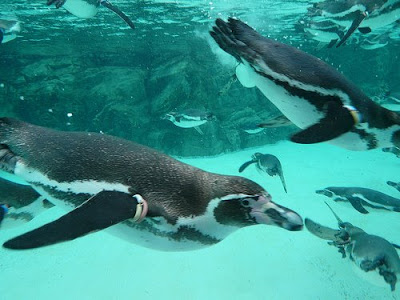
Every year, Brazil airlifts dozens of penguins back to Patagonia or Antarctica. On last Friday, rescuers and penguin experts have reported that hundreds of young penguins swept from the icy shores of Patagonia and Antarctica are washing up dead on Rio de Janeiro's tropical beaches, Brazil. Rescuers and those who treat penguins are divided over the possible causes.
According to Eduardo Pimenta, supervisor for the state coastal protection and environment agency in the resort city of Cabo Frio, there are more than 400 penguins have been found dead on the beaches of Rio de Janeiro state over the past two months, most of them young. Moreover, he said that it is common here to find some penguins (both dead and alive) swept by strong ocean currents from the Strait of Magellan. However, this year is the worst.
A veterinarian at the Niteroi Zoo (the state's biggest zoo), Thiago Muniz, said that he believed over fishing has forced the penguins to swim further from shore to find fish to eat, but that leaves those penguins more vulnerable to getting caught up in the strong ocean currents. Muniz added, Niteroi has already received about 100 penguins for treatment this year and many are drenched in petroleum. The Campos oil field that supplies most of Brazil's oil lies offshore. Moreover, he said that he had not seen penguins suffering from the effects of other pollutants. However, he pointed out that already dead penguins are not brought in for treatment.
Pimenta pointed out pollution is to blame. He said that aside from the oil in the Campos basin, the pollution has been lowering the animals' immunity. Moreover, he added, the pollution has also been leaving them vulnerable to funguses and bacteria that attack those animals’ lungs.
Nevertheless, biologist Erli Costa of Rio de Janeiro's Federal University pointed out weather patterns could be involved. He did not think the levels of pollution are high enough to affect the birds so rapidly. According to his analysis, global warming that affects ocean currents and creates more cyclones, making the seas rougher. Moreover, he said the vast majority of penguins turning up are baby birds, which have just left the nest and are unable to out-swim the strong ocean currents they encounter while searching for food.
Thank you for visiting SurayBlog
skip to main |
skip to sidebar
Thinking is the beginning of enlightenment, which brings a huge impact and change in human life. Non-realize thinking are considered as resources that will not guide someone to attain wisdom. The wisdom has transformed into words without subjectivity and completely without object, which penetrates the equality of all things, is undifferentiated.









No comments:
Post a Comment